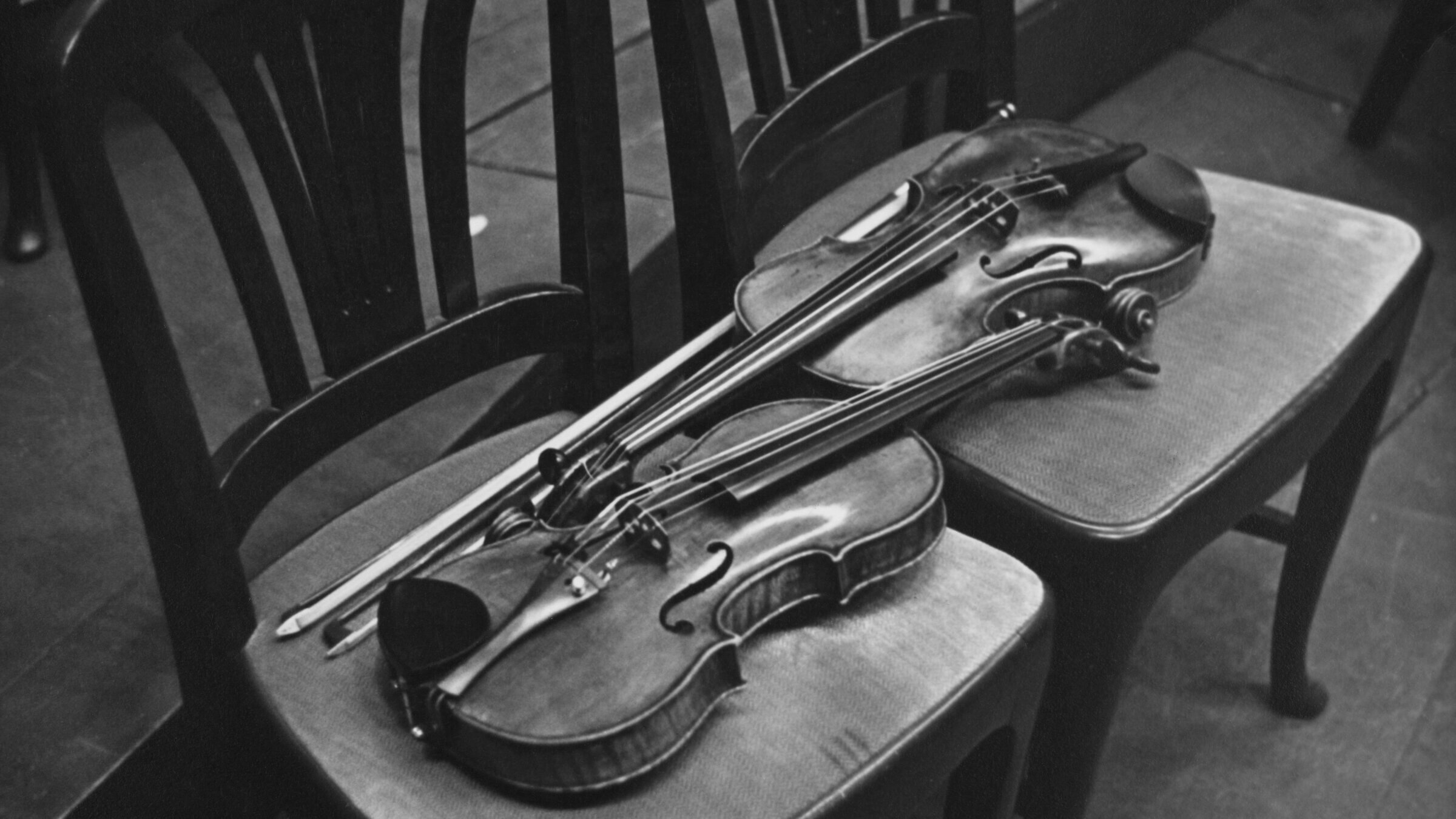Nearing a Prayer: How my violin has helped me learn to pray
Perhaps “T’filah,” a piece for solo violin, can help to bring us a little closer together

A pair of violins resting side by side backstage. Photo by Getty Images
This is one in a series of essays written by high school students in response to the events of Oct. 7 and its aftermath. You can find the full collection of essays at this page.
In second grade, I went to Hebrew school for the first time. Every Wednesday after school, workbooks for an hour, T’filah in the sanctuary, graham crackers, and apple juice. I remember that after I finished the first workbook and knew all of the letters in the Hebrew alphabet, I flipped to the first page of my book, took out a pencil, and wrote a dalet, a nun next to the dalet, a yud next to the nun, and finally a hei. I stared at my name and it stared back at me. I smiled seeing the “i” replaced with a yud. My name finally made sense.
After seven years in Hebrew school, and four canceled dates due to COVID, I finally had my Bat Mitzvah. We were looking for caterers in the East Village and we came across Balade, a Lebanese restaurant. Having Lebanese food and a party in the rec room of a church on my block was the perfect representation of my bohemian, artsy upbringing. When we went for the taste test, the waiter asked us if we were Lebanese. When we told him no, he responded by explaining that Dania is a very common Lebanese name. My dad smiled and nodded at me as if to say, “See, this is why we named you Dania.”
My mom got pregnant with me as my grandmother was dying and when my parents were looking for baby names, they were set on finding something in Hebrew because there was something very spiritual for my parents about having the gift of a child in a time of pain. They also wanted a name that couldn’t be pinpointed to a specific place on a map. A name that would make people ask questions.
When I started high school, my name created a lot of confusion. I had to say, “No, it’s Don-ya” for months and then repeat the same thing sophomore and junior year. It’s always the “i” that throws people off. It’s as if they know it should be a yud. I try to tell people the correct pronunciation as much as I can, but in some ways I like listening to their interpretations. Each
person hears or pronounces it in a different way and leaves me with a new way to think about my name. With every misunderstanding, my name is imprinted with someone else’s viewpoint; it changes, and so do I.
At the end of my sophomore year, one of the contemporary pieces my violin teacher recommended for my jury was T’filah by Lera Auerbach. I remember thinking as I listened to the piece, Of course I’ll play T’filah. I’m Jewish. But the more I thought about it, the more I doubted myself. Did I want to play it because I’m Jewish? Or did I want to play the piece because I love the music? Or because it’s a Holocaust memorial piece and I felt an obligation to my family? T’filah means prayer and I was afraid of the idea of playing a prayer. I told myself that I didn’t want to be predictable, but I think deep down, I was afraid that I wouldn’t know how to pray.
I don’t remember where I was, or what I was doing, or really anything about the moment when I found out that Israelis had been attacked on Oct. 7. I remember thinking about my cousins, aunt, and uncle who live in Israel. And I remember briefly thinking about T’filah. Why hadn’t I played the piece? Why hadn’t I tried to play a prayer?
Dania means “G-d is my judge” in Hebrew, which for a not-super-religious person hasn’t always been my favorite meaning for a name. When my mom first heard the meaning, she wasn’t so sure either, but my dad told her that it really means only G-d can judge you. He felt it was empowering to always know that no one can make a conclusion about you except for G-d. I recently found out that in Arabic, Dania means “close” or “near.” I still dream about meeting another Dania. Even meeting a Danya or a Donya or a Daniyah. I know one day I will find her.
It took me a year, but I’m learning T’filah. The sheet music came in the mail a few days ago and under the title, it says “Prayer for Violin Solo.” There is no accompaniment to the piece — the violinist plays alone, isolated on stage. But as I listen to the piece and look at the score, I realize there’s a reaching quality throughout the moving lines. A hand, I imagine, extending to all of the Jewish and Muslim Danias of the world. A hand bringing them all just a little bit closer.















